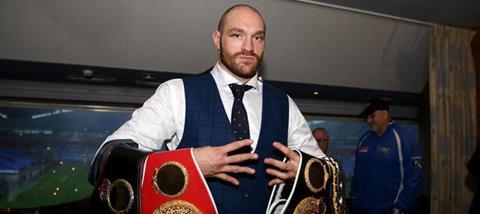Ex-police officer John Sutherland says that while his heart goes out to Tyson Fury following the fatal stabbing of his cousin, solving knife crime needs more than just tougher prison sentences

My heart goes out to Tyson Fury and his extended family as they grieve the loss of Rico Burton – as it does to the families of all those who have been lost to the devastating realities of knife crime in this country.
And I understand the calls for greater levels of enforcement and tougher sentences for those caught carrying and using knives. But, if we are serious about actually fixing the problem we are faced with, we are going to have to go a whole lot deeper than that.
I served as a police officer for more than 25 years and, during my time in uniform, I found myself standing in far too many of the haunted places where teenagers and young men had lost their lives.
In 2007, I stood at the scene of the murder of Kodjo Yenga. I watched his family gather and I listened to the shattering sound of their grief.
In 2008, I sat in my office with the ashen-faced father and sister of Ben Kinsella and struggled desperately to find the right words to say.
In 2011, I stood at the scene of the murder of Milad Golmakani – a children’s playground in north London – and tried to absorb the horror of it all.
In 2012, I stood at the scene of the murder of Dogan Ismael and attempted to find an answer to the journalist’s questions.
Four young men I had never met became four young men I will never forget.
And one of the greatest tragedies of recent times is that, in the ten years since Dogan lost his life, almost nothing seems to have changed. It just keeps on happening. And so, here we are, talking about it again.
But I’m tired of talking. I’m tired of responding to the same dull questions, year after year: Have the police lost control of the streets? Don’t we just need more Stop & Search? Surely the answer is tougher prison sentences? Closed questions that are indicative of closed minds. Mostly, I’m tired of the utter senselessness of it all. Because it doesn’t have to be this way. We don’t have to keep waking up to the grim repetition of the same nightmarish headlines.
But in order for anything to change, we are going to have to completely change our approach to the problem. In particular, we need to get beyond defining it in purely criminal terms. And we need to get beyond describing the solution in law enforcement terms alone. This is about so much more than just policing.
Here then is my four-point plan for tackling knife crime in this country:
1. A long term plan
We need a long term plan for dealing with knife crime – at least ten years, preferably twenty. We need to understand that, where problems have been a generation or more in the making, they might just take a similar amount of time to mend.
We have got to get beyond the relentless demand for ineffective quick fixes. The professional and effective use of police Stop & Search powers undoubtedly saves lives, and prison sentences represent an important deterrent, but neither of those things offers the long-term answer to anything.
2. A public health approach
We need to completely re-frame our understanding of violence, recognising it as a public health challenge as much as a crime problem. We need to realise that violence is a disease that can be caught and transmitted. But we also need to see that it can be diagnosed and treated.
The roots of violence lie in the real-life consequences of generational poverty and inequality, and in the repeated childhood exposure to extreme trauma. And none of those things is going to be mended by a myopic focus on crime alone.
The work of the Violence Reduction Units in Glasgow and beyond are beginning to show how it might be done.
3. Operational independence from political control
The response to knife crime needs to remain completely independent from any form of political control. When politicians are in charge, experience suggests that the response to any pressing concern remains vulnerable to partisan priorities and shifting political winds. And we simply cannot allow that to keep happening.
Some things are far too important to be left to politics. Knife crime is one of them.
4. Policing at the heart, but not at the head
The police will always be first in line to respond to knife crime, and that is exactly as it should be. There is no greater duty or privilege for a police officer than to save the life of another human being, but the police should not be in overall charge of the plan. Knife crime is – and has always been – a whole society problem that demands a whole society solution.
We can’t keep on doing the same things and expecting different outcomes. That way, madness lies. And we’re way past the time for talking. It’s time to do what needs to be done. Kodjo and Ben and Milad and Dogan and Rico and all of the rest deserve no less.


































